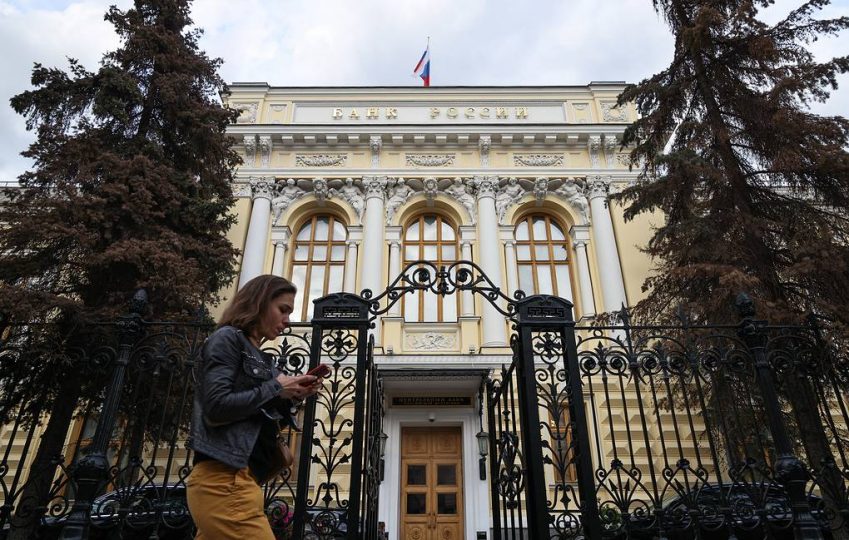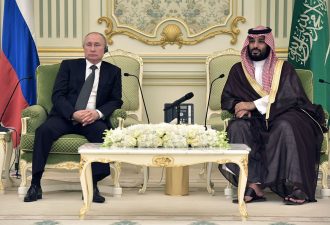Vedomosti: Will Russia’s lowered key rate revive the economy?
Following an extraordinary session, the Bank of Russia lowered the key rate for the second time in a row – for three percentage points at once, now to 11%. The external conditions remain complex for the Russian economy, however, weekly data indicate a significant slowdown of price hikes, according to the regulator. “The flow of funds to fixed-time ruble deposits continues while the loan activity remains low. This limits pro-inflation risks and provides for the necessity to relax monetary factors,” the bank’s statement said.
The dynamics with which the Bank of Russia is lowering the key rate is very serious, Rostislav Rovbel, a member of the General Council of Delovaya Rossiya says. Its decrease will heighten the accessibility of lending resources, which means the money will contribute to the economy, and enterprises will develop, with reasonable risks, he thinks. “[So] 11% under the current conditions is a certain happy medium between the hopes of businesses and the Central Bank’s policy. Of course, we would have liked for it to be lower but this is a good start for Entrepreneur Day,” he noted.
Those who are ready to take out loans will wait for the key rate to decrease further, according to Vice President of the Chamber of Commerce and Industry of the Russian Federation Elena Dybova. She thinks that the figure of 11% induces optimism. However, in order to develop import replacement, domestic production and long-term investment which the economy needs now, the optimal rate should be 5% at the most.
The corporate sector is experiencing troubles over high loan percentages amid barriers on imports, Mikhail Zeltser, a stock market expert at BCS World of Investments, states. In his opinion, the regulator will continue to lower the key rate and it can easily reach 10% soon.
Nezavisimaya Gazeta: Kiev regime’s mining of Black Sea waters to fuel global famine
At 8 am on Thursday, Russia opened two humanitarian maritime corridors for the passage of foreign vessels from ports in the Black and Azov Seas. According to head of Russia’s National Defense Control Center Mikhail Mizintsev, these are “the safe pathways for ships.” However, their safety is merely provisional – the waters of the Black Sea ports controlled by the Ukrainian Navy are rigged with mines.
According to Chairman of the Central Committee of the All-Russian Trade Union of Military Servicemen Captain 1st Rank Oleg Shvedkov, when the representatives of Russia’s Defense and Foreign Ministries talk about the humanitarian corridors in the Black Sea, they, above all, pursue two goals. “First of all, to show to the global community that the main obstacle for the exit of foreign ships from the ports controlled by Ukraine is Ukraine’s own stance. Since, according to our information, it took measures to rig mines throughout its Black Sea waters and coast.” The expert noted that the situation with wheat supplies being blocked in the Black Sea port benefits both countries to a certain extent. “Moscow demonstrates to the world that the culprit for the looming starvation and global food crisis is Kiev who blocked the ports with mines, while Russia is ready to ensure the passage of vessels in its control zone. While Ukraine, by blackmailing the world with the Russian blockade, is demanding to increase military aid,” he notes.
“Apparently, it is possible to explain the mild reaction of Ukraine’s leadership to the global community’s demands to unblock and demine the ports by the fact that Kiev simply doesn’t want to take risks and weaken its defenses on this territory in case of a possible attack on the Ukrainian coast by the Russian Black Sea fleet,” military expert, retired colonel Nikolay Shulgin thinks. He noted that lately, according to open data in media outlets and social networks, the air reconnaissance activity by NATO and the Ukrainian Air Force has significantly increased in the Black Sea near Snake (Zmeiny) Island which might be a sign of preparations for a possible new raid.
Nezavisimaya Gazeta: Washington seeks to spurn Moscow from Iran deal negotiations
The Biden administration hopes to diminish the importance of Russia’s role in the process of reviving the nuclear deal with Iran. US Special Representative for Iran Robert Malley confirmed to the US Congress that his team is looking for an alternative partner who can assume responsibility to accept the excess of enriched uranium if the agreements are revived. After the Joint Comprehensive Plan of Action (JCPOA) was signed in 2015, this mission was once accomplished by Moscow.
In a conversation with the newspaper, Policy Director at United Against Nuclear Iran Jason Brodsky confirmed that following the onset of Russia’s special military operation in Ukraine, Western officials began seeking another country for the deliveries of excess enriched uranium from Iran. The analyst mentioned China and Kazakhstan. He noted that this raises a wider issue of whether Russia would use its seat in the UN Security Council in order to create additional difficulties for the nuclear deal, since the geopolitical situation has changed.
Additionally, the expert noted that the US leadership has concerns over the Russian-Iranian $10 bln contract on expanding the Bushehr NPP. These agreements can provide Moscow with an important financial inflow while under Western sanctions pressure, he explained.
Rossiyskaya Gazeta: Ukraine conducted intensive military preparations, deployed troops near Russian borders
Russian border guards have been noting an increase of new threats from the Ukrainian side on the border since 2014, 40 anti-Russian acts have been committed since then, according to FSB’s First Deputy Director, Head of the Border Service Army General Vladimir Kulishov.
“Starting from 2014 and up until this February, the Ukrainian side had undertaken over 40 anti-Russian actions on the state border. Over this period, the Russian border guards jointly with territorial security bodies, the units of the Armed Forces and the National Guard, intercepted over 120 provocations against Russian citizens as well as ships and other Russian economic objects in the waters of the Black and Azov Seas,” he noted.
Additionally, the activity of criminal groups intensified associated with the organization of channels for cross-border smuggling of weapons and munitions, dual-purpose products, fuel and lubricants and consumer goods. According to Kulishov, since 2014, due to the actions by the Ukrainian side, a list was formed of border security threats which were unconventional for this area.
At Kiev’s initiative, cross-border cooperation was halted, there have been attempts of unilateral demarcation of contested sections of the state border. “With the support of Western partners, the Ukrainian side conducted intensive military preparations, accompanied by deploying troop formations in the areas bordering the Russian Federation. These activities were held amid active anti-Russian propaganda,” the head of the FSB Border Service noted.
Izvestia: Syria braces for Turkey’s new operation
On the eve of a new military operation in northern Syria against Kurdish formations, Turkey’s National Security Council held a session where the participants stated that the military operation won’t be directed against Syria’s territorial integrity. However, the Syrian parliament told Izvestia that Damascus condemns Ankara’s plan while the army won’t tolerate such “intervention” and will aspire to liberate the country’s entire territory. Turkey’s military operation will also be a violation of the October 2019 agreements between Ankara and Moscow. The State Duma specified to the newspaper that the issue should be resolved through talks with Russia without making unilateral decisions.
“We established contacts with Turkey along military and diplomatic lines a long time ago. I think, the time for talks has come, they should take place between the two countries in order to prevent a direct conflict of interests (in Syria),” First Deputy Chairman of the Federation Council Committee on Foreign Affairs Vladimir Dzhabarov told Izvestia.
The main goal of the Turkish operation is to create a safe zone for refugees in northern Syria in order to launch the process of their return home from Turkey, according to political scientist, professor at the Turkish-German University Enes Bayrakli. He says that against the background of the 2023 presidential election, the issue of refugees became very important in Turkey since the country received almost 4 mln Syrian refugees, local residents are not happy with their sheer numbers, and the opposition uses this issue to its advantage.
According to the expert, the agreements with Russia and the US do exist yet the time has come to adjust them due to the geopolitical shift, both in the Middle East and beyond. The political scientist thinks that Turkey and Russia will be able to find “a golden middle way.”
TASS is not responsible for the material quoted in these press reviews
SOURCE: TASS




